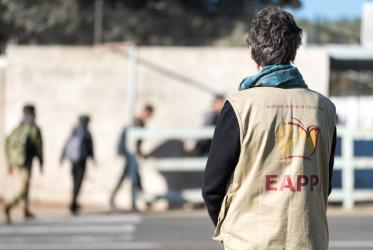In a mood of hope, solidarity and compassion, the World Council of Churches (WCC) olive harvest initiative continued on Wednesday with a live-streamed public webinar, addressing cultural, socio-economic and spiritual aspects of the olive harvest season in the Holy Land, as well as highlighting the impact of the continuing military occupation of the Palestinian territories.
In his opening remarks, followed by a moment of prayer, WCC interim general secretary, Rev. Prof. Dr Ioan Sauca pledged to continue working with member churches, partners and networks, both locally and internationally, to provide accompaniment and monitor the situation in this challenging time.
“As a global community, we are gathering this year for a special olive harvest initiative to express solidarity and raise public awareness of the constraints and injustices Palestinians endure, along with continuous threats, harassments and vandalizations of their land and property,” Sauca said.
An estimated 2.5 million olive trees have been uprooted since the occupation of the West Bank in 1967. The Separation Barrier dividing peoples, along with numerous restrictions and permit requirements imposed by the occupation, has severely constrained Palestinian farmers´ access to their own land. Continuous harassment and violence by Israeli settlers and the COVID-19 pandemic hindering physical presence by accompaniers and other outside observers have compounded the vulnerability of Palestinian communities in the Holy Land.
Still, the olive harvest season now underway remains surrounded by strong cultural and spiritual significance, and is a time of rejoicing and celebration for many Palestinians. This year, in the absence of international ecumenical accompaniers on the ground, it is a particularly challenging task to monitor the situation and raise public awareness of the daily hardships of life under occupation.
In the opening webinar, guest speakers addressed the olive harvest from different perspectives, together with national and local coordinators of the WCC Ecumenical Accompaniment Programme in Palestine and Israel, former ecumenical accompaniers and WCC programme executives. The webinar was an opportunity to engage together with public viewers in support of a just peace in the Holy Land.
Shireen Awwad Hilal, director of the Community Outreach at Bethlehem Bible College, emphasized the cultural significance of the harvest season and the olive tree as a symbol of identity and unity.
“The olive harvest is something we all, women, men, children, Christians and Muslims alike, participate in together”, she explained and urged all viewers overseas to be ambassadors of peace, and to pray for Palestine.
This year, the COVID-19 pandemic has prevented visitors from travelling to the Holy Land, which has made life in Palestinian communities less secure.
“A presence of eye-witnesses from abroad makes us feel more protected from abuse,” Hilal added.
From an economic perspective, the olive harvest and the industries associated with it contribute significantly to the Palestinian economy. Ramallah-based businessman, writer and peace activist Sam Bahour shared his account of the economic implications of the occupation for the olive oil industry.
“Being a labour-intensive industry, it is particularly vulnerable to restrictions in terms of transportation and access to land imposed by the occupation. Farmers are often hindered to get to their land to tend to their trees year-round, because not enough gates through the wall are open. You can have the best olive trees in the world, but if you can’t get to them, it won’t do any good,” Bahour pointed out.
The olive oil industry makes up about 20 percent of Palestine’s national output and more than 5 percent of its gross national product. Seventy-five percent of the production is consumed domestically, 22 percent is exported to neighbouring countries while the remaining three percent is exported to premium markets abroad.
“It is a highly competitive market and the additional production costs entailed by the occupation has in some cases made imported products from other Mediterranean countries cheaper than our own,” Bahour explained.
The spiritual aspects of the olive harvest season are underscored by the fact that Bethlehem, where Jesus Christ was born, is surrounded by olive plantations. Rev. Ashraf Tannous, pastor in the Evangelical Lutheran Church in Jordan and the Holy Land, described the olive tree as a sign of peace, “older than anyone” – a holy tree inherited by the Palestinians: “This season is a holy time when we go off to harvest. The olive tree breathes the history of the land, it embodies the blood, sweat and care of our ancestors. It is so painful to see it uprooted,” he said, before concluding on a note of hope inspired by Martin Luther: “Even if I know that tomorrow is the end of the universe, I will still plant an olive tree. Because no matter how dark it is, the sun will rise tomorrow morning.”
The Olive Harvest initiative continues throughout the harvest season, in close cooperation with partner organizations, including Rabbis for Human Rights.









